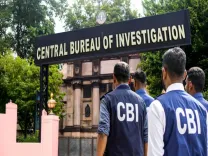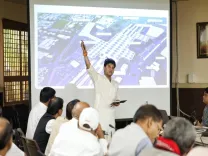What is the significance of the Indian Police Service's 76-year legacy?

Synopsis
Key Takeaways
- IPS was founded on September 15, 1948.
- It is crucial for law and order maintenance.
- SVPNPA is the premier training institution for IPS.
- Training includes modern topics like AI and cybercrime.
- IPS officers serve in diverse and challenging environments.
Hyderabad, Sep 15 (NationPress) On September 15, 2025, we celebrate the 76th anniversary of the Indian Police Service (IPS), an essential pillar of India's civil governance and internal security architecture.
Founded on September 15, 1948, the IPS has transformed into one of the most esteemed components of the All India Services, crucial in preserving law and order, combating terrorism, and safeguarding constitutional principles nationwide.
The IPS’s training journey commenced with the establishment of the Central Police Training College (CPTC) in Mount Abu, Rajasthan, on the very same day in 1948.
For nearly 20 years, Mount Abu was the nurturing ground for police leadership, providing comprehensive physical, legal, and ethical training to aspiring officers.
In 1967, acknowledging its broadened responsibilities and growing national importance, the institution was renamed the National Police Academy (NPA).
This transformation marked a new direction for police training, incorporating modern policing methods, leadership cultivation, and collaboration among agencies. A significant rebranding occurred in 1974, when it was renamed the Sardar Vallabhbhai Patel National Police Academy (SVPNPA), in honor of India's first Deputy Prime Minister and Home Minister.
Sardar Patel was pivotal in founding the All India Services, and this renaming commemorated his lasting impact on India's administrative structure.
The following year, in 1975, the academy was relocated to Hyderabad, then part of Andhra Pradesh and now in Telangana. This move facilitated access to a wider array of facilities, modern infrastructure, and a strategic site for national training.
Currently, SVPNPA occupies 277 acres in Shivrampalli, Hyderabad, and stands as the leading training center for IPS officers selected through the All India Civil Services Examination.
Over the years, the academy has evolved alongside the shifting landscape of law enforcement, integrating educational modules on cybercrime, counter-terrorism, forensic science, and community policing.
It continues to host seminars and specialized courses, including recent topics such as Artificial Intelligence, Urban Policing, and National Security, demonstrating its dedication to adapting to contemporary challenges.
As the IPS commemorates 76 years of devoted service, the nation pays homage to the commitment, discipline, and bravery of its officers serving in various terrains and facing numerous challenges. The legacy of SVPNPA and the IPS exemplifies India’s dedication to justice, integrity, and public service.





